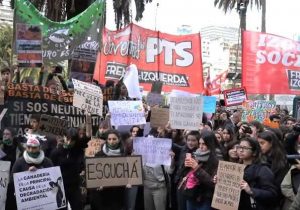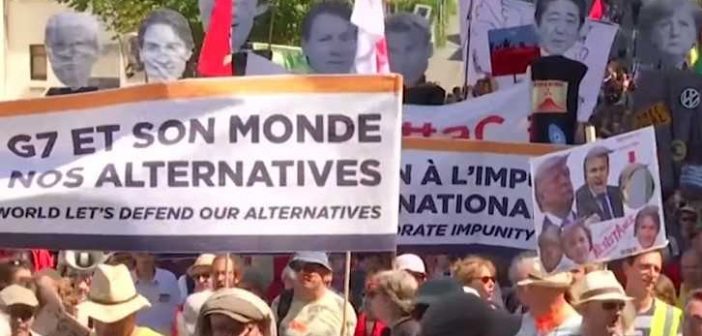If you kept your head in the sand, you could make believe that things are much as they were ten or twenty years ago. The August Bank Holiday is here and the Notting Hill Carnival looks like it will have good weather – just like the old days (sometimes). The media is full of another royal scandal. The England cricket team has won a Leeds Test Match thanks to the heroics of an all-rounder superstar, as if it were 1981. But the signs of an impending world and national crisis cannot be kept out of even the most obdurately optimistic media, especially as they areentre stage at the G7 summit in Biarritz. And that crisis will pose deadly threats to the working class in Britain and internationally.

Demonstrators outside the Brazilian embassy in London. Top of page anti-G7 demonstrators at the French/Spanish border.
At a global level, two things stand out. First there are strong signs of another world recession. The announcement that the German economy is in negative growth is ominous. A decade of worldwide austerity has virtually ensured another recession. And Donald Trump’s trade war against China, plus Brexit, have thrown fuel on the flames.
Second, the response to the Amazon wildfire crisis in Brazil, with Angela Merkel, Emmanuel Macon and now (laughably) Boris Johnson demanding action, is very significant. These capitalist leaders have not suddenly become eco-warriors determined to save the plant. The extent of popular anger can no longer be ignored. An understanding that the wildfire crisis is linked to predatory extractive capitalism, which has zero regard for the lives and well-being of indigenous peoples, is widespread. As is the realisation that the thumbs-up given to loggers by far-right Brazilian president Jair Bolsonaro is the proximate cause of the crisis. The United States, of course, is the one major Western capitalist power not to have negatively commented on the failures of the Brazilian government.
Donald Trump’s August 23 ‘order’ that US firms had to quit China – something quite impossible – was a petulant response to China’s announcement of new tariffs against US goods. Trump is furious because, unlike Iran, China has the capacity to hit back against American economic aggression, with substantial effect. In fact China has been reluctant to be drawn into a trade war, understanding the negative effects for its own situation and the world economy.
In the present situation, the world slowdown plus trade wars and Brexit could combine to create a new financial crash. While it took untold billions of quantitative easing dollars to stabilise the US and British economies after the 2008 crash, it is far from clear that such an operation could be repeated. Crash could turn into slump, with devastating consequences.
The new Chinese tariffs against US goods are entirely retaliatory. Trump’s initiation of the trade war was a recognition that the United States’ position as the global economic and political leader is under threat, a threat that has been dealt with by ramping up both economic and military pressure against Beijing.
In the first days of the Johnson premiership, the character of this government has been shown by its declarations on Brexit, immigration and crime.
The announcement by Home Secretary Priti Patel that free movement between Britain and the EU would be stopped on day one of Britain crashing out of the EU has caused consternation among European citizens living in Britain. An estimated two million EU citizens have not registered for settled status. Now there is the danger of a ‘Windrush’ situation on a grand scale, with many thousands of people liable to be deported. Many of them have lived here for years or have children born here who are thus UK citizens. At the very least, hundreds of thousands will fear not being re-admitted to Britain if they go abroad.
Stopping free movement, plus a swathe of reactionary proposals on crime, show how the Johnson government is preparing for a general election. The only question is whether it will come before or after a final Commons vote on a no-deal Brexit. In the general election the Tories will go all out to mobilise the most reactionary sections of the population, disproportionately older and white, on a socially backward, xenophobic, anti-immigrant platform. It will be a carnival of reaction that can only be countered by mobilising the most progressive sections of the population on an anti-Hard Brexit platform. It should not be automatically assumed that the Labour defectors who voted Liberal Democrat during the European elections in June can automatically be won back. It needs clear evidence of Labour’s determination to fight against a hard Brexit and in defence of immigrant workers.
Xenophobia and racism at the top have emboldened the fascists. Racist attacks and attacks on other minorities are at significantly higher levels since the 2016 referendum. The violent attack on left-wing journalist Owen Jones was a sign of the times. As Jones himself points out, there is a distinct lack of outrage about the growing tide of extreme right-wing violence. A general election waged by the Tories under the banner of a hard Brexit, attacking immigrant workers’ rights, building more prisons and lengthening sentences, will further generate an atmosphere in which the fascist street thugs and other violent racists will be emboldened.
Boris Johnson’s pre-G7 summit trip around European capitals was mainly for show. There is no serious belief anywhere that Johnson will be able to negotiate a new deal with Europe, in particular because the European Union will not give up the ‘Backstop’ arrangement, designed to prevent a hard border between the Irish Republic and the northern Six Counties.
Any attempt to ditch the backstop would be vetoed by the Irish Republic. As veteran Derry socialist Eamon McCann pointed out on Channel 4 news, if customs posts and check points are put along the Irish border, then within days people will be shooting at them. More likely, as a first step, thousands will be marching from north and south across the border to demonstrate its injustice and uselessness. The shooting will come later.
Irish prime minister Leo Varadkar cannot give way on the Backstop; his government would fall if he did. On the other hand, a temporary Backstop arrangement would presuppose a close alignment of UK and European tariffs, something that is anathema to the dominant Tory right wing. Boris Johnson says he doesn’t want a hard Brexit, but in reality, that is what his government is preparing for.
All the signs are that while Britain hurtles towards a no deal Brexit, preparations for it are chaotic. The government’s own documents reveal likely shortages of food and medicines, and chaos at ports. Food and medicine security is of central importance to the working class, especially the older and poorer sections, who are very vulnerable to supply disruption. Things will play out badly for the vast majority of the population if Britain crashes out of the EU and becomes a vassal state of the United States. Johnson leads a government with no majority and faces defeat in parliament over his drive for a no deal Brexit. His response has been to seek legal advice over closing down parliament. Should he do this he will ignite a political crisis that will be impossible to extinguish. Hundreds of thousands will take to the streets. So at the moment the Tories wait and prepare the ground for such a move. We must prepare too.
The mobilisations in Britain and elsewhere in protest at the Brazil rainforest crisis show the extent of socially progressive forces, especially among the youth, who can be mobilised against the dangers that threaten humanity. Task one is to prevent a hard Brexit in the UK, to begin to drive back extreme right reaction.

